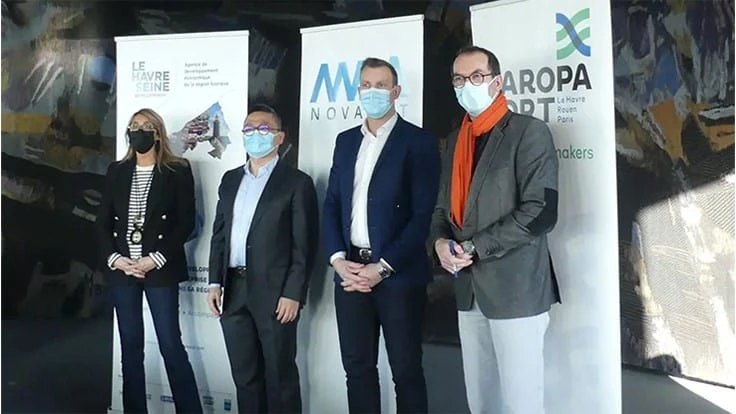
Photo provided by Le Havre Seine Développement.
A France-based firm called Nova Met has signed an agreement with a port agency to set up a plant to recycle aluminum scrap near Le Havre, France. An announcement by the HAROPA (Le Havre, Rouen, Paris) Port agency says the Le Havre Seine Développement office also was involved in arranging the agreement.
Nova Met is setting up its secondary aluminum production site in an industrial building in Rogerville, within the Port Industrial Zone of Le Havre, says HAROPA. Earlier this month, the company signed a temporary occupation agreement with for a 20,000-square-meter (215,000 square feet) site.
HAROPA describes Nova Met as being “born from the meeting of three players in metal recycling.” The firm plans to set up “an automated grinding and processing line to collect, purify and cold refine 2,500 metric tons of aluminum per month,” adds the agency.
The recycled-content aluminum made will be destined for both Asian and European markets, with a target of 80 containers per month “shipped to South Asia by 2023,” states the HAROPA news release.
The aluminum produced “is a material of choice for the transport, building, packaging and engineering sectors,” says HAROPA. It lists window profile, car rims, casings and mixed aluminum as scrap grades that will be accepted at the new plant.
“Signing with HAROPA Port is for us the start of a great adventure and opening up to the world by boat,” says Alexis Noyer, associate director of Nova Met. “A big thank you to all the interlocutors, without whom this signature would not have taken place; your support and your efficiency have been of great help in our project.”
Get curated news on YOUR industry.
Enter your email to receive our newsletters.
Latest from Recycling Today
- Green Cubes unveils forklift battery line
- Rebar association points to trade turmoil
- LumiCup offers single-use plastic alternative
- European project yields recycled-content ABS
- ICM to host colocated events in Shanghai
- Astera runs into NIMBY concerns in Colorado
- ReMA opposes European efforts seeking export restrictions for recyclables
- Fresh Perspective: Raj Bagaria






